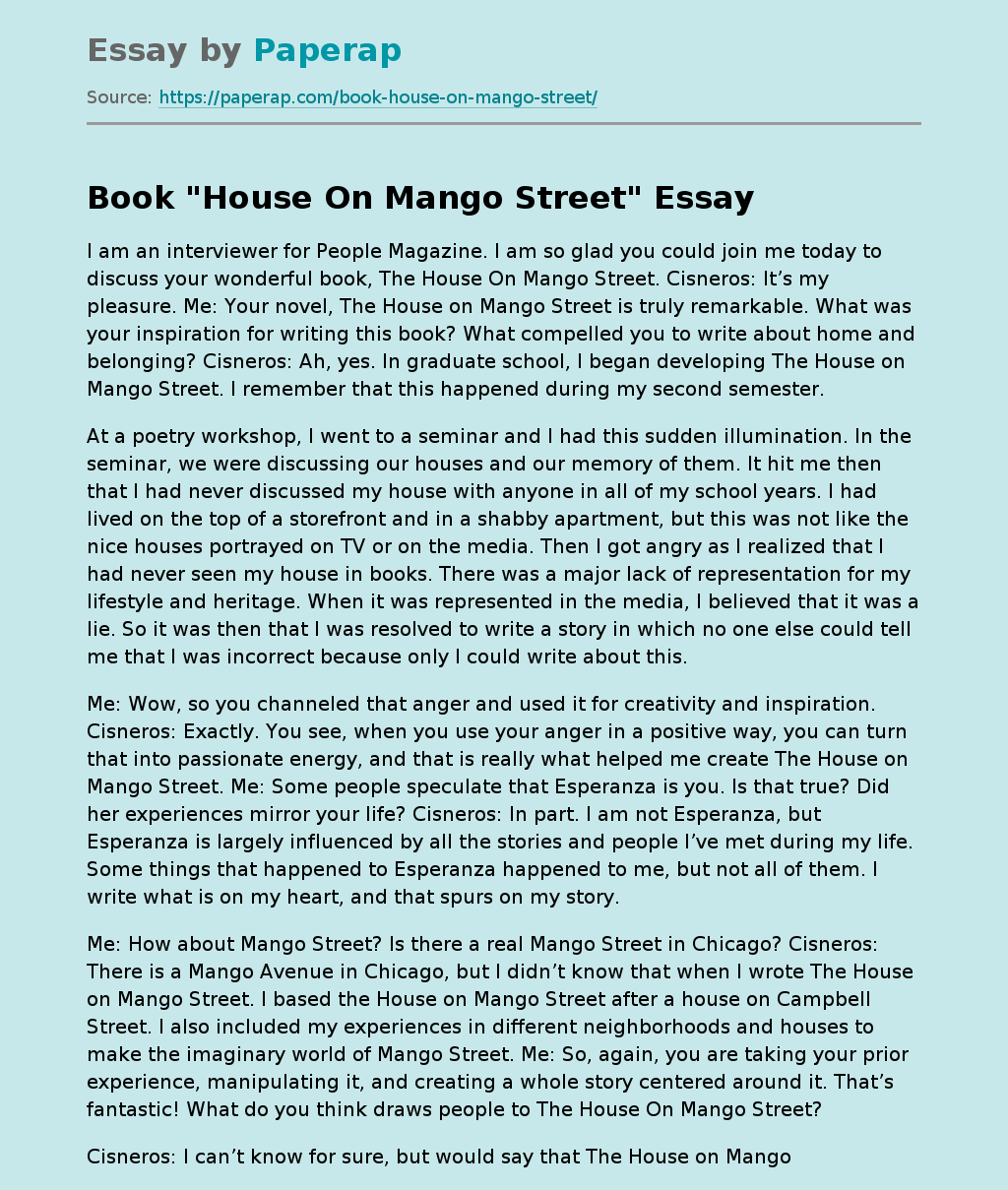Book "House On Mango Street"
I am an interviewer for People Magazine. I am so glad you could join me today to discuss your wonderful book, The House On Mango Street. Cisneros: It’s my pleasure. Me: Your novel, The House on Mango Street is truly remarkable. What was your inspiration for writing this book? What compelled you to write about home and belonging? Cisneros: Ah, yes. In graduate school, I began developing The House on Mango Street.
I remember that this happened during my second semester.
At a poetry workshop, I went to a seminar and I had this sudden illumination. In the seminar, we were discussing our houses and our memory of them. It hit me then that I had never discussed my house with anyone in all of my school years. I had lived on the top of a storefront and in a shabby apartment, but this was not like the nice houses portrayed on TV or on the media. Then I got angry as I realized that I had never seen my house in books.
There was a major lack of representation for my lifestyle and heritage. When it was represented in the media, I believed that it was a lie. So it was then that I was resolved to write a story in which no one else could tell me that I was incorrect because only I could write about this.
Me: Wow, so you channeled that anger and used it for creativity and inspiration. Cisneros: Exactly. You see, when you use your anger in a positive way, you can turn that into passionate energy, and that is really what helped me create The House on Mango Street. Me: Some people speculate that Esperanza is you. Is that true? Did her experiences mirror your life? Cisneros: In part. I am not Esperanza, but Esperanza is largely influenced by all the stories and people I’ve met during my life. Some things that happened to Esperanza happened to me, but not all of them. I write what is on my heart, and that spurs on my story.
Me: How about Mango Street? Is there a real Mango Street in Chicago? Cisneros: There is a Mango Avenue in Chicago, but I didn’t know that when I wrote The House on Mango Street. I based the House on Mango Street after a house on Campbell Street. I also included my experiences in different neighborhoods and houses to make the imaginary world of Mango Street. Me: So, again, you are taking your prior experience, manipulating it, and creating a whole story centered around it. That’s fantastic! What do you think draws people to The House On Mango Street?
Cisneros: I can’t know for sure, but would say that The House on Mango Street is relatable. For teenagers and young people especially, The House On Mango Street is a testament to their loneliness and their feeling of separation from the world. I think that everyone at some point struggles with this. Everyone, like Esperanza, will have either an identity crisis or sense of isolation at times. And I believe that The House On Mango Street shows the readers that they aren’t the only ones who struggle with depression, loneliness, and fear.
Me: Throughout The House on Mango Street, there is a theme of Esperanza searching. In some cases she wants to fit in, in other cases she wants to look pretty. But what is Esperanza primarily looking for? What does she desire? Cisneros: Esperanza wants to reinvent herself. She doesn’t yet know who exactly she wants to become, but she is looking at other people, specifically other women, and deciding if she wants to be like them or if doesn’t want to be like them. Esperanza is searching for the person she wants to be, even if she can’t see that in her own life. She wants to be independent, but also she wants to fit in. Me: Why did you choose to write The House on Mango Street as a series of vignettes?
Cisneros: I wrote it in vignettes because it gives the reader freedom. They can choose to read one story, a couple of stories, or the whole entire book. I also wrote it in this form so that it was accessible and inclusive to people of all ages. I wrote it with the intention that everyone – children, adults, grandparents – could read the story and take with them different inspirations or new thoughts. Me: Is there anyone in your life who didn’t want you to become a writer? Cisneros: My father didn’t want me to become a writer. He actually wanted me to become a weather girl just like the Latina girls on TV. It was about two years before he died when he finally accepted that I was a writer.
Me: With that in mind, do you have any advice for aspiring writers out there? Cisneros: My main piece of advice for all you young hopeful writers out there is to get an education. Your education will give you independence and the confidence to put your beliefs and values on paper. Me: Do you believe that our culture limits the freedom of women like Esperanza? Cisneros: We live in a male-dominated society, and so often the views of women are shut down and ignored.
Esperanza is limited in The House of Mango Street because she is a Latina girl in a poor neighborhood where there isn’t much hope and opportunity for her. But Esperanza keeps searching, amidst trials, for the person she wants to be. Me: Well thank you, Ms. Cisneros, for sharing about The House on Mango Street today. It was my pleasure interviewing you. Cisneros: Thank you! I enjoyed this as well.
Book "House On Mango Street". (2021, Dec 10). Retrieved from https://paperap.com/book-house-on-mango-street/

